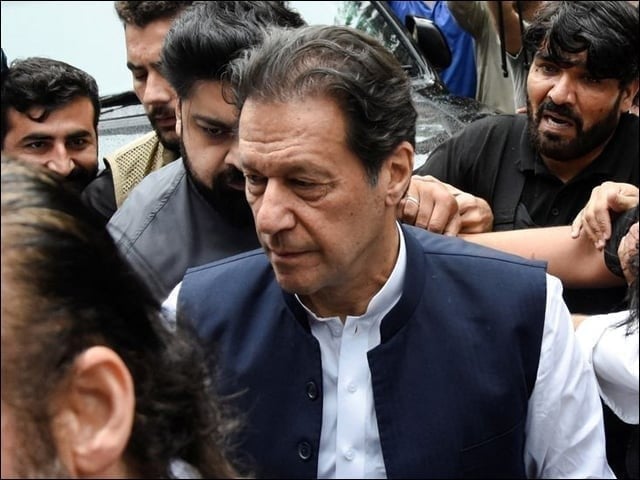“PTI Founder Denies Allegations of Instructing Hidden PTI Members to Reveal Themselves”
Imran Khan Warns of Severe Consequences If ‘Plan B’ Is Enacted, Denies Claims of Hidden PTI Members
Imran Khan, the imprisoned founder of Pakistan Tehreek-e-Insaf (PTI), has issued a stark warning that if the so-called ‘Plan B’ of the establishment is put into action, Prime Minister Shehbaz Sharif could become a ‘missing person’ as soon as he steps down from office. Khan made these remarks during an informal conversation with journalists at Adiala Jail on Thursday.
In response to claims that he had ordered any concealed PTI members to come out into the open, Khan firmly denied these allegations. “I categorically deny this news,” he asserted, rejecting the notion that he had given such instructions.
Khan’s comments reflect his broader criticism of the current government and its handling of political and security issues. He alleged that authorities have resorted to kidnapping PTI members, asserting that Deputy Superintendent of Jail Akram was abducted under dubious circumstances. “The police claim he eloped with a girl, but everyone knows who kidnapped Akram,” Khan stated, suggesting that the circumstances of Akram’s disappearance are being misrepresented.
Addressing the implications of his ‘Plan B,’ Khan suggested that if implemented, it could result in Prime Minister Shehbaz Sharif becoming a ‘missing person’ immediately upon leaving office. This provocative statement highlights the heightened tensions between Khan’s PTI and the current administration.
The former prime minister also took the opportunity to criticize the government’s shifting narratives regarding terrorism. He pointed out inconsistencies in the official accounts of terrorism’s resurgence, stating, “They first claimed that resettlement after negotiations brought terrorism back. Now, [Interior Minister] Mohsin Naqvi says cross-border terrorism is happening. This means they are lying.” Khan’s criticism underscores his concerns about the government’s handling of security issues and its impact on national stability.
Khan emphasized the necessity of cooperation with the Afghan government to combat the terrorism posed by the Tehreek-e-Taliban Pakistan (TTP). “Terrorism is destroying the country. How can I not condemn it?” he questioned. Khan also raised concerns about the government’s responsibilities in addressing terrorism in Balochistan and riverine areas, stressing that effective counter-terrorism measures are crucial for national security.

He proposed that the resolution of terrorism in Balochistan would require the inclusion of Baloch representatives in the decision-making process. “The Baloch are turning against the country, which is very dangerous for Pakistan. This blame falls entirely on the establishment,” Khan said, indicating his belief that the lack of representation and engagement with the Baloch people is exacerbating the conflict.
Additionally, Khan expressed frustration over the stalled implementation of electronic voting machines (EVMs), blaming former army chief General Qamar Javed Bajwa, the Election Commission of Pakistan (ECP), and the Pakistan Peoples Party (PPP) for obstructing this reform. “With Chief Justice Qazi Faez Isa’s departure, four constituencies will be opened, and this government will collapse,” Khan predicted, emphasizing his view that electoral reforms are crucial for political stability.
Khan also reaffirmed his commitment to the PTI’s planned rally on September 8, despite any potential obstacles. “We will not cancel the September 8 rally under any circumstances. I urge the public to come out and participate. Workers should not tolerate any obstacles during the rally,” he declared, highlighting his determination to mobilize PTI supporters.
In addition to political and security concerns, Khan lamented the current economic situation in Pakistan, criticizing the government’s handling of economic policies. “No investment is coming in. The economy is sinking, and the government keeps borrowing. With no income, how will we repay these loans?” he questioned, reflecting his apprehension about the country’s financial stability.
Khan’s statements paint a picture of a turbulent political landscape, marked by allegations of government overreach, inconsistencies in policy, and economic distress. His call for action and critique of the current administration highlight ongoing challenges and the deepening political divide in Pakistan.

